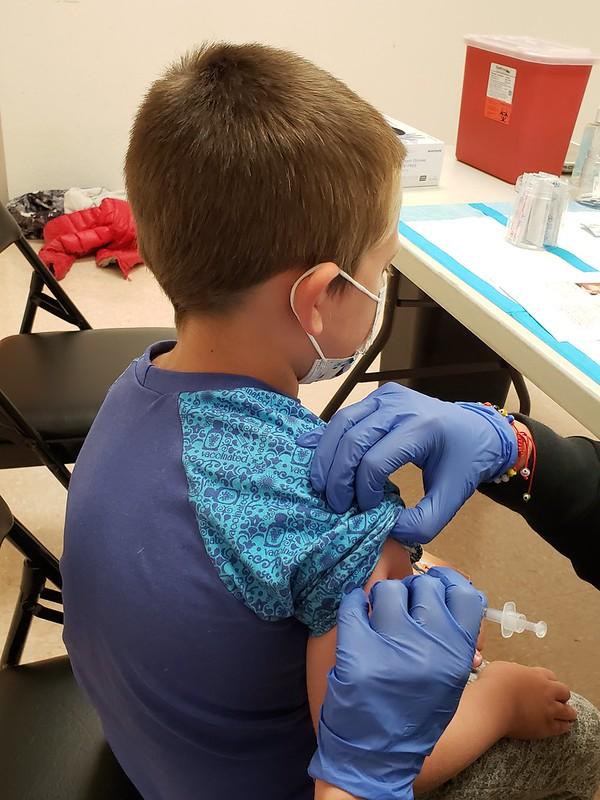Morbidity and Mortality Weekly Report published two preliminary studies late last week on Pfizer/BioNTech COVID-19 vaccine safety and efficacy in school-aged children, one finding that serious adverse events in children 5 to 11 years old were rare, and the other showing an estimated 92% effectiveness against infection in 12- to 17-year-olds.
Reactions common but serious events rare
In the first study, US Centers for Disease Control and Prevention (CDC) researchers analyzed data from the Vaccine Adverse Event Reporting System (VAERS) and the v-safe parental smart phone app on adverse events in children aged 5 to 11 from Nov 3 to Dec 19, 2021. Median age was 8 years, and 44.6% were boys.
Serious adverse events were defined as those requiring hospitalization or long hospital stays and those that are life-threatening or lead to permanent disability, birth defects, or death.
VAERS received 4,249 adverse event reports after administration of 8.7 million COVID-19 vaccine doses to children aged 5 to 11, and 97.6% weren't serious.
Of the 42,504 children in this age-group enrolled in v-safe, 57.5% had local reactions, and 40.9% had systemic reactions, including pain at the injection site, fatigue, and headache. In the week after receipt of the first vaccine dose, 54.8% of children had local reactions, while 40.9% had systemic reactions. Adverse systemic reactions were more common in the week after the second dose (40.9%) than after the first, with fever occurring in 13.4%, versus 7.9% after the first dose.
More adverse events after second dose
The most common nonserious events were related to vaccine administration, including no adverse event (27.9%), product preparation issue (22.3%), and incorrect dose (16.3%). The most common conditions and findings among the 100 reports of serious events were fever (29.0%), vomiting (21.0%), and increased troponin, indicating heart damage (15.0%).
Among 12 serious reports of seizure, 1 child had syncope (loss of consciousness after a drop in blood pressure) rather than a seizure, another child may have had syncope, 2 children experienced a fever-related seizure, 1 child had a history of seizures, 2 may have had an evolving seizure disorder, and 5 had new-onset seizures.
Of 15 children with preliminary reports of myocarditis (inflammation of the heart muscle), 7 recovered, and 4 were recovering by study end.
The deaths of 2 girls aged 5 and 6 years were reported; both had multiple chronic medical conditions and were in poor health before vaccination. No data suggested a causal link between vaccination and death.
The authors noted that their preliminary findings were comparable to those from preauthorization clinical trials. "Vaccination is the most effective way to prevent COVID-19 infection," they wrote. "Parents and guardians of children aged 5–11 years should be advised that local and systemic reactions are expected after vaccination with Pfizer-BioNTech COVID-19 vaccine and are more common after the second dose."
The Pfizer vaccine received emergency use authorization for two doses administered 3 weeks apart for those ages 5 to 11 on Oct 29, 2021, and the Advisory Committee on Immunization Practices recommends vaccination for this age-group. Pfizer is the only COVID-19 authorized for children 5 to 17 years.
Substantial protection against infection for adolescents
The second, ongoing, real-world, study — led by CDC researchers — involved 243 adolescents 12 to 17 years old in Arizona who underwent weekly nasal swab COVID-19 testing and submitted symptom reports for 19 weeks, from Jul 25 to Dec 4, 2021. The study period was marked by dominance of the Delta (B1617.2) variant.
Among the adolescents, 190 were fully vaccinated, while 30 were partially vaccinated, and 66 were unvaccinated. Of all participants, 51.4% were boys, 74.5% were 12 to 15 years, 87.7% were white, 74.5% were non-Hispanic, and 85.2% had private health insurance.
Estimated adjusted vaccine effectiveness (VE) at least 14 days after the second dose, regardless of symptom status, was 92% (95% confidence interval, 79% to 97%). Twenty-one of 243 participants (8.6%) tested positive for COVID-19, 18 (85.7%) of them reporting symptoms.
Five infections occurred over 21,693 fully vaccinated person-days, for an incidence rate of 0.23 per 1,000 person-days. Over 4,288 unvaccinated person-days, 16 COVID-19 cases were reported, for an incidence rate of 3.73 per 1,000. Two infected participants from the same household sought outpatient care. No COVID-19 cases were identified among partially vaccinated participants.
"The VE estimates described in this report for the Pfizer-BioNTech vaccine in real-world conditions during the period of Delta variant predominance corroborate and expand upon the VE estimates from other recent studies in adolescents and reinforce previous findings that current vaccination efforts are resulting in substantial preventive benefits among adolescents aged 12–17 years," the researchers concluded.






















